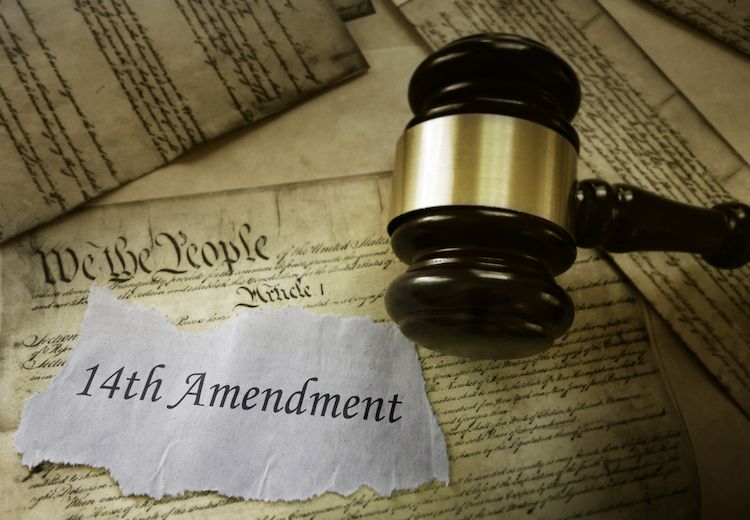Evidentiary hearing begins in suit to block Trump from Colorado ballot under 14th Amendment

At issue in a Colorado lawsuit is whether former President Donald Trump is disqualified under Section 3 of the 14th Amendment, which bars people who have taken an oath to support the U.S. Constitution from holding office if they “engaged in insurrection or rebellion” against the Constitution. Image from Shutterstock.
A weeklong evidentiary hearing begins Monday in Denver to determine whether former President Donald Trump should be banned from the ballot in Colorado for engaging in insurrection.
Judge Sarah B. Wallace of the state’s 2nd Judicial District Court is hearing the case, report the Denver Post, the New York Times, the Associated Press and Reuters.
The Sept. 6 lawsuit was filed by six Colorado voters who are represented by Citizens for Responsibility and Ethics in Washington.
At issue is whether Trump is disqualified under Section 3 of the 14th Amendment, which bars people who have taken an oath to support the U.S. Constitution from holding office if they “engaged in insurrection or rebellion” against the Constitution.
The suit claims that Trump violated the oath by recruiting, inciting and encouraging the mob that attacked the U.S. Capitol on Jan. 6, 2021. Lawyers for Trump have argued that it is up to Congress, not the states, to determine whether an elected president is qualified for office, according to New York Times.
Trump’s lawyers point to Section 3 of the 20th Amendment, which partly states, “Congress may by law provide for the case wherein neither a president-elect nor a vice president-elect shall have qualified.”
Trump’s lawyers also argue that he did not incite the Capitol attack, and the suit to remove him from the Colorado ballot would interfere with the former president’s First Amendment rights.
Wallace has asked lawyers to address the meaning of the 20th Amendment at the Oct. 30 hearing, along with eight other topics. They include the meaning of “engaged” and “insurrection” as used in the 14th Amendment and whether Trump’s actions met that standard.
According to Reuters, Wallace rejected arguments Oct. 25 that courts don’t have the power to determine eligibility for office. She previously rejected four other bids to toss the case.
The suit names Colorado Secretary of State Jena Griswold, a Democrat, as a defendant because her office certifies the statewide ballot. Trump has intervened in the case.
Trump is also facing ballot challenges in Minnesota and Michigan that are led by a group called Free Speech for People. The Minnesota Supreme Court is scheduled to hear oral arguments Nov. 2.
Write a letter to the editor, share a story tip or update, or report an error.



